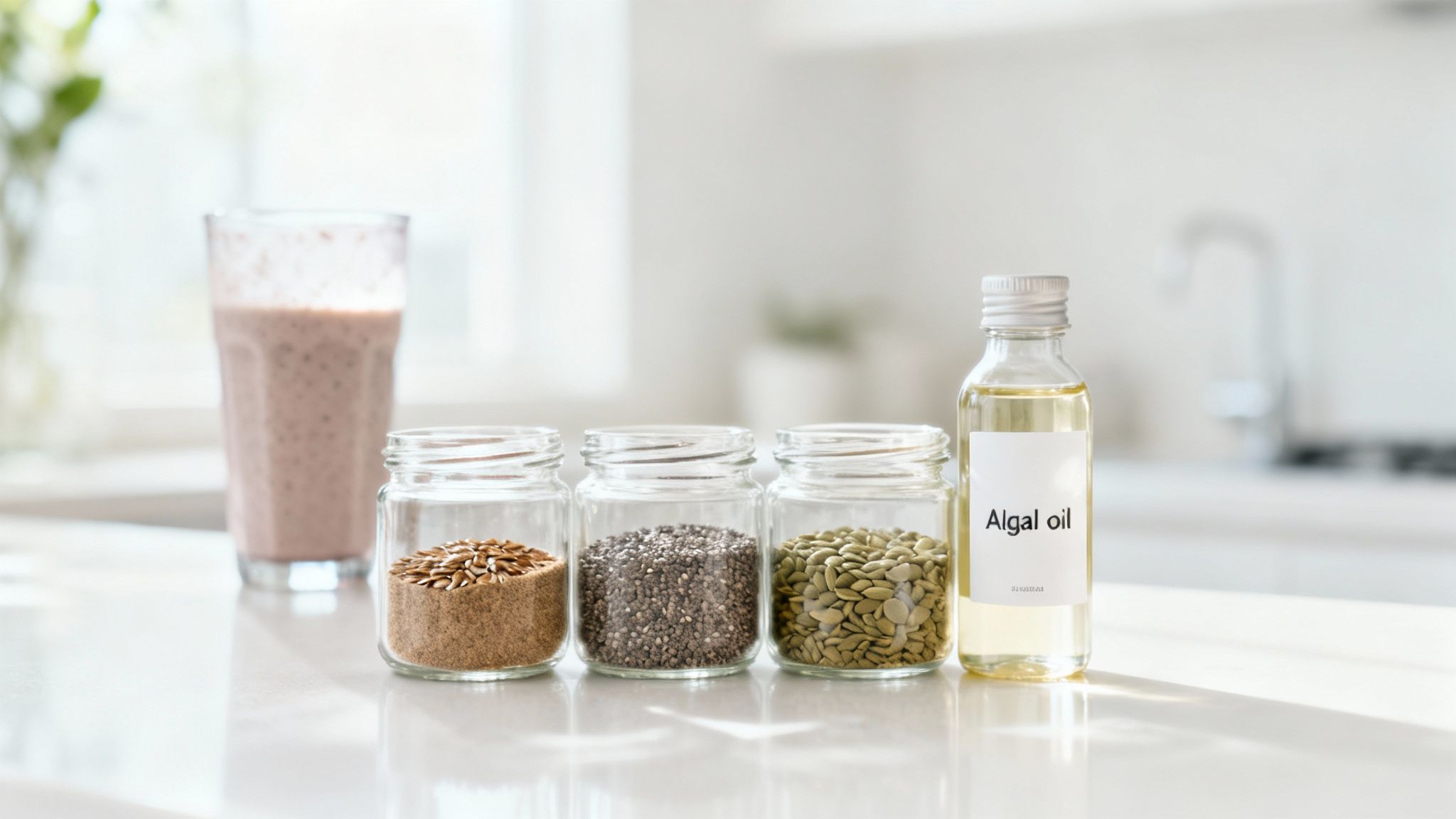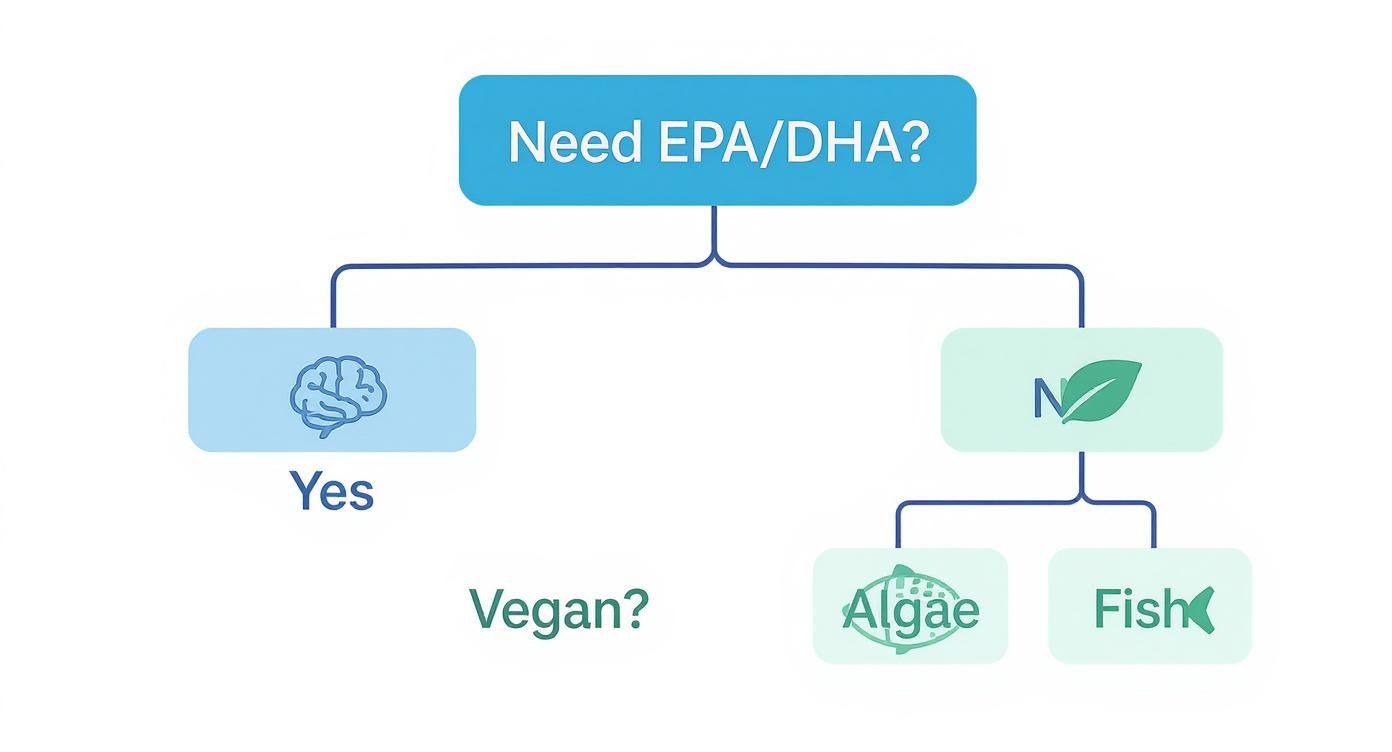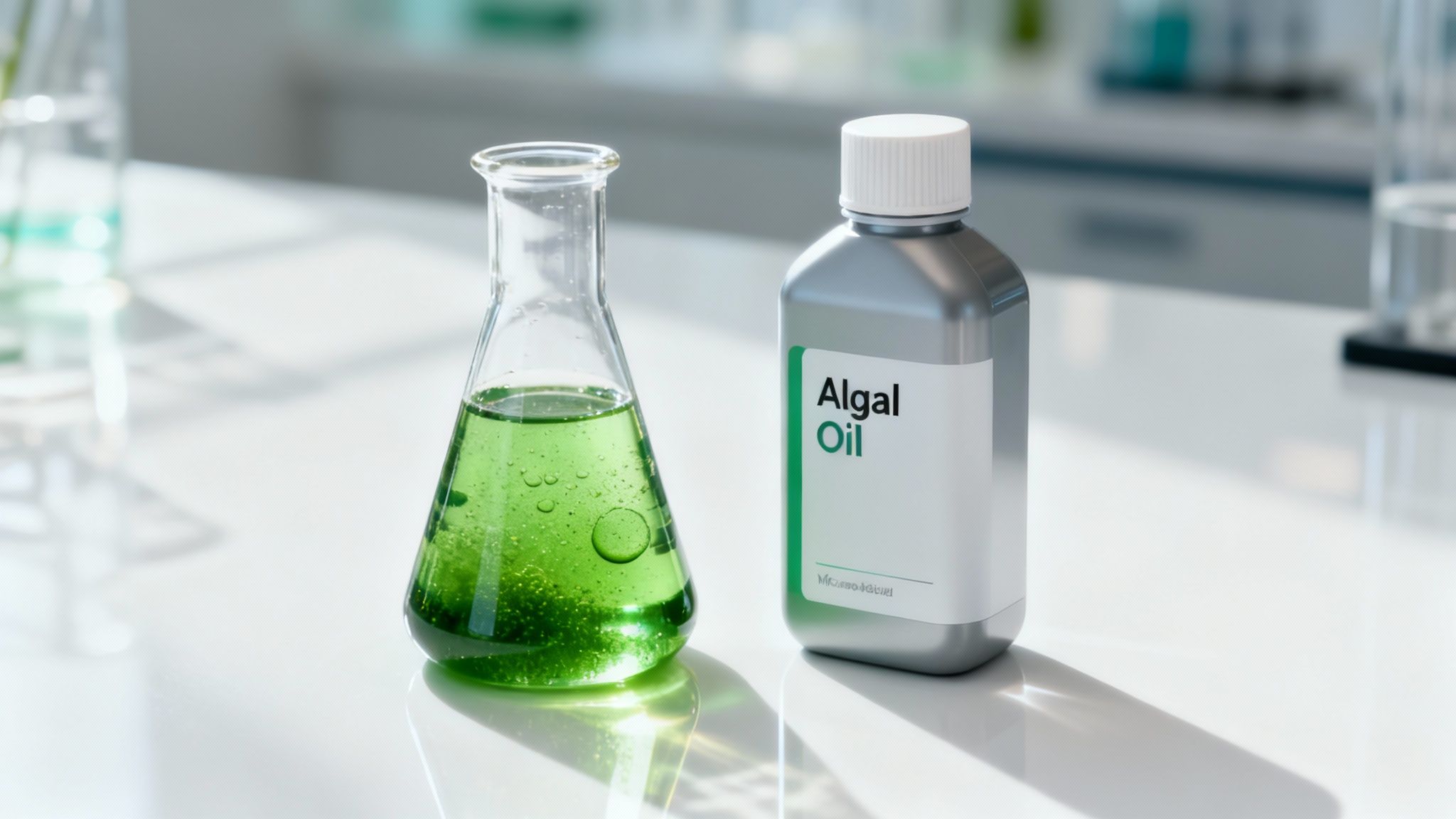Vegan Alternatives to Fish Oil That Actually Work
So, you're on the hunt for vegan alternatives to fish oil, and you've probably heard a lot about seeds and nuts. But here’s the real talk: the most direct and effective plant-based source is actually algal oil. Why? It's one of the few vegan options that gives you EPA and DHA, the same heavy-hitting omega-3s found in fish. While sources like flax, chia, and hemp seeds are super healthy, they only contain ALA, which our bodies really struggle to convert into the more critical EPA and DHA. For that reason alone, algal oil is the clear winner for supporting your brain and heart.
Your Guide to Effective Plant-Based Omega-3s

It’s a super common concern: how do you get enough of the right omega-3s without fish? You want all those amazing, well-documented benefits for your brain and heart, but fish oil just isn't an option for you. The good news is, you absolutely don't have to compromise. We’ve got you.
This guide will walk you through the best vegan alternatives to fish oil, explaining which sources deliver the most impact and why. We'll break down how to easily incorporate them into your routine, so you can feel confident you’re giving your body the essential fatty acids it needs to thrive.
Of course, getting your omega-3s is just one piece of the puzzle. As you fine-tune your diet, you might also find yourself looking for other great plant-based swaps, like the best vegan butter substitutes for your favorite recipes.
Let's start with a quick comparison of the top vegan omega-3 sources.
| Source | Omega-3 Type | Direct EPA/DHA? | Best Use Case |
|---|---|---|---|
| Algal Oil | EPA & DHA | Yes | The most effective daily supplement for meeting brain and heart health needs. |
| Flaxseeds | ALA | No | A great source of fiber and ALA; best used ground in smoothies or oatmeal. |
| Chia Seeds | ALA | No | Excellent for hydration and ALA; ideal for puddings or as an egg replacer. |
| Hemp Seeds | ALA | No | Adds protein and ALA to salads and yogurt; a versatile nutritional booster. |
The Big Omega-3 Question: Is There a Better Way Than Fish Oil?
We all know omega-3s are crucial. They're the good fats that keep our brains sharp, our hearts ticking along nicely, and inflammation in check. It's a non-negotiable part of staying healthy.
For years, the conversation about the most important omega-3s- EPA (eicosapentaenoic acid) and DHA (docosahexaenoic acid)- always led back to one place: fish oil. But let's be honest, relying on fish oil is becoming a tough pill to swallow for a lot of us.
The Trouble with Traditional Fish Oil
First, there's the environmental elephant in the room. Overfishing is seriously damaging marine ecosystems, and that’s a problem we can't just ignore. The health of our oceans is directly linked to the health of our planet.
Then you have the purity problem. Dun, dun, dun- unwelcome contaminants. Our oceans are unfortunately full of things like heavy metals, mercury, PCBs, and even microplastics. These toxins build up in fish and can easily find their way into the fish oil supplements on your shelf. Yikes!
And of course, for anyone who is vegan or simply trying to eat more plant-based, fish oil is completely off the table. It’s clear we need a cleaner, more sustainable source for these essential nutrients. Moving toward vegan omega-3s isn't just a fad; it's a responsible choice for our bodies and our world.
The Boom in Plant-Based Omegas
This growing awareness has sparked a huge shift. People are actively looking for vegan alternatives to fish oil that deliver results without the ethical or environmental baggage. This isn't just a small group anymore; it's a mainstream movement.
The market numbers tell the story. The global vegan omega-3 supplement market was valued at $1,617.0 million in 2023 and is expected to climb to $2,979.3 million by 2030. What's driving this growth? Algae-based supplements are the clear front-runner, holding over 75% of the market share. You can see the full market breakdown and trends here.
What this means for you: You don't have to compromise anymore. Effective, high-quality, and sustainable vegan omega-3s are here, making it easier than ever to fuel your body while honoring your values.
It's obvious people are ready for something better. They want the incredible benefits of EPA and DHA, but without the downsides. It’s all about making a choice that you can feel good about, inside and out.
Comparing The Top Vegan Omega-3 Sources
If you're looking for plant-based alternatives to fish oil, it's easy to think any option will do. You sprinkle some flax on your oatmeal or toss chia seeds into a smoothie and feel good about your choice. But let's have a frank chat: I do NOT think all vegan omega-3 sources are created equal.
The difference isn't minor; it's the critical factor determining whether your body actually gets the brain- and heart-supporting nutrients it needs. The whole conversation boils down to the type of omega-3 you're getting: ALA versus EPA and DHA.
Algal Oil: The Direct Route to EPA and DHA
First up, the undisputed champion of vegan omega-3s: algal oil. Most people don't realize that fish get their omega-3s from eating algae. So by taking algal oil, we’re just going straight to the original, clean source.
What makes it so special? Algal oil is the only plant-based source that gives you a direct, ready-to-use form of both EPA (eicosapentaenoic acid) and DHA (docosahexaenoic acid). Your body can absorb and put these fatty acids to work immediately, no extra steps required. Think of it like getting a fully prepared meal delivered to your door instead of a box of raw ingredients you still have to cook.
Why this matters for you: Your brain, eyes, and heart run most efficiently on direct EPA and DHA. When you take algal oil, you're giving your body the most potent and bioavailable form of omega-3s to support cognitive function and cardiovascular health- no guesswork involved.
Flax, Chia, and Hemp Seeds: The Conversion Challenge
Now, let's talk about those popular seeds: flax, chia, and hemp. They are absolute nutritional powerhouses, loaded with fiber, protein, and other fantastic nutrients. They're also rich in an omega-3 called ALA (alpha-linolenic acid).
Here's the catch. Your body can't directly use ALA for those specific brain and heart functions. It first has to convert ALA into EPA, and then into DHA. This is where things get tricky.
This conversion process is notoriously inefficient. For most people, less than 1% of the ALA you consume actually makes it all the way to the DHA your brain craves. A 2018 review in the Journal of Nutrition confirmed this, highlighting just how little ALA converts to these long-chain fatty acids. So while these seeds are a fantastic part of a healthy diet, relying on them as your main omega-3 source simply isn't a reliable strategy for getting enough EPA and DHA.
This decision-making process helps clarify which source is right for your specific health goals. This flowchart visualizes the simple path to choosing an effective omega-3 source based on whether you need direct EPA and DHA.

As you can see, if your goal is to get the benefits of EPA and DHA, algae is the clear and direct vegan path.
A Side-by-Side Look at Your Options
To make it even clearer, let's put these sources head-to-head. Understanding the differences helps you build a smarter plant-based plate and supplement routine. You can learn more about how to decode supplement facts in our guide on how to read supplement labels.
Vegan Omega-3 Sources: A Direct Comparison
Here's a side-by-side look at popular vegan omega-3s, focusing on the fatty acid type, conversion efficiency to EPA/DHA, and practical uses.
| Source | Primary Omega-3 Type | Provides Direct EPA/DHA? | Bioavailability & Usefulness | Best For |
|---|---|---|---|---|
| Algal Oil | EPA & DHA | Yes, directly. | High. Your body absorbs and uses it immediately for brain, heart, and eye health. | Daily supplementation to reliably meet EPA and DHA needs. This is the gold standard. |
| Flaxseeds | ALA | No. | Very Low. The conversion to DHA is less than 1%, making it an unreliable source for these key nutrients. | Adding fiber and a small ALA boost to smoothies, oatmeal, or baked goods. Always use ground flax for better absorption. |
| Chia Seeds | ALA | No. | Very Low. Similar to flax, the conversion rate is extremely poor. | Hydration and fiber. Great for making puddings, thickening sauces, or as an egg substitute. |
| Hemp Seeds | ALA | No. | Very Low. The body's conversion process remains the major roadblock. | Adding plant-based protein, healthy fats, and minerals to salads, yogurt, or bowls. |
The takeaway is clear: while seeds are a wonderful part of a balanced diet, they can't replace a direct source of EPA and DHA. For a truly effective vegan omega-3 strategy, algal oil is the most logical and scientifically sound choice. It closes the gap that ALA sources leave open, ensuring you get the powerful benefits you’re looking for.
Algal Oil: The Direct Vegan Source for EPA & DHA
Let's talk about the real star of the plant-based omega-3 world: algal oil. This isn't just another option on the list; it's a genuine breakthrough because it directly solves the biggest challenge with vegan omega-3s- the poor conversion of ALA into EPA and DHA.

Here’s the simple, elegant truth: fish don't actually produce EPA and DHA. They get these critical fats by consuming microalgae. With algal oil, we simply skip the middle-fish and go straight to the original, pure source.
The Science of a Purer Source
Unlike fish that live in oceans with varying levels of pollutants, the microalgae used for high-quality supplements are cultivated in meticulously controlled, clean environments.
This isn't just a small detail- it's the most important one. This controlled cultivation process completely sidesteps the risk of ocean-borne contaminants, which remains a significant concern with many fish oil products.
What does this mean for you? You get a pure, potent dose of EPA and DHA without having to worry about mercury, PCBs, microplastics, or other toxins that can accumulate in fish. It's clean, simple, and incredibly effective.
This method guarantees a level of purity and safety that wild-caught fish just can't match. It’s a win for our health and a huge victory for our oceans, helping protect fragile marine ecosystems from the strain of overfishing.
Pure, Potent, and Planet-Friendly
Choosing algal oil isn’t just a smart move for your health; it's a powerful statement for sustainability. The production cycle is remarkably efficient.
The non-fish omega-3 supplement market, largely driven by algae, was valued at USD 1.4 billion in 2025 and is projected to reach USD 2.5 billion by 2035. This incredible growth is powered by a more sustainable model; the production cycle for algal omega-3 is a mere 25 days, a stark contrast to the two-plus years required for fish oil. You can find more insights on this sustainable shift in this report.
This efficiency means we can produce top-tier omega-3s with a significantly smaller environmental footprint.
Making It Easy with Yuve
Knowing the science is great, but consistently incorporating it into your daily life is what really matters. For us at Yuve, the mission to create a clean, effective, and enjoyable vegan omega-3 was deeply personal. Our founder, Sam, spent years searching for a source that didn't leave a strange aftertaste or cause digestive issues. That frustrating experience is precisely what led to the creation of Yuve's Vegan Omega-3 Gummies.
We started with high-quality, sustainably sourced algal oil to provide a direct source of DHA and EPA. Then, we transformed it into a delicious, easy-to-take gummy. Taking your daily omega-3s should be a smart, proactive step to feel great, not a chore you have to suffer through.
Here’s why this approach is a core part of the solution:
- No Fishy Burps: Finally, you can say goodbye to that unpleasant, lingering aftertaste so common with fish oil supplements. We get the frustration, and we solved it.
- Pure and Clean: Sourced from algae grown in a controlled environment, our gummies are free from ocean contaminants.
- Deliciously Simple: Taking your daily omega-3s feels more like a treat than a chore, making consistency almost effortless.
By choosing a supplement like Yuve's Vegan Omega-3 Gummies, you’re not just adding a nutrient to your diet. You’re embracing a smart, proactive solution that makes it easy to get the vital, clean omega-3s your body needs to thrive. It's the worry-free way to support your brain and heart health, day in and day out.
How to Choose a High-Quality Vegan Omega-3
So, you’re on board with algal oil. That’s great! But the moment you start shopping, it can get overwhelming fast. Walking down the supplement aisle or scrolling online reveals dozens of bottles, all making big promises. How do you actually know which one is worth your money?
Don't sweat it, we've got you covered. Picking a top-notch vegan omega-3 is really just about knowing what to look for on the label. Think of this as your insider's guide to decoding supplement facts so you can choose with complete confidence.
What to Look for on the Label
The front of the bottle is all marketing- it might scream "1000 mg of Algal Oil," but the real information you need is on the back. Flip it over and zoom in on the supplement facts panel.
-
Check the EPA and DHA Amounts: This is priority number one. You need to see the exact milligram (mg) amount for both DHA and EPA listed separately. A product can have a high total oil content but be surprisingly low in the specific omega-3s that matter. For general wellness, aim for a combined daily dose of 250-500 mg of EPA and DHA.
-
Look for Transparency: Good brands aren't shy about their process. They should be open about where their algae is sourced and how the oil is extracted. Vague language or a lack of detail is usually a red flag.
Purity and Potency: The Non-Negotiables
If you take away one piece of advice, let it be this: never compromise on third-party testing. This is your single best guarantee of quality. It means an independent lab has verified two critical things.
First, the lab confirms potency, making sure the amount of EPA and DHA on the label is what's actually in the softgel or gummy. Second, it checks for purity by screening for contaminants like heavy metals, pesticides, and microbes.
This step is essential because it provides an unbiased seal of approval. It's how you know you’re getting a safe, effective supplement and not just expensive snake oil. It’s a standard we take seriously at Yuve, which is why we rigorously test our products.
If a brand doesn't mention third-party testing, I'd seriously think twice. We've actually put together a detailed guide on what makes for the best third-party tested supplements if you want to dive deeper.
Finding the Right Form for You
Supplements are not a one-size-fits-all deal. The form you choose can make all the difference in whether you actually stick with it.
-
Softgels: This is the classic option. They’re convenient and straightforward if you’re already used to taking pills. The only downside is that some can be pretty large and tough to get down.
-
Liquids: Liquid algal oil is perfect for anyone who wants to customize their dose or mix it into a morning smoothie. However, the oily texture and distinct taste just aren't for everyone.
-
Gummies: Here's where taking your supplements can actually become enjoyable. Gummies are a fantastic solution if you hate swallowing pills, have a sensitive stomach, or just want a little treat.
Let's be real- the thought of choking down another big pill is just... ugh. This is exactly why we created Yuve's Vegan Omega 3 DHA Gummies. We wanted to make getting your daily dose a treat instead of a chore. They deliver a potent dose of clean, algal-derived DHA in a delicious, easy-to-chew form. It’s hands down the easiest way to stay consistent and give your brain and body the support they need, minus any of the hassle.
Your Simple Plant-Powered Omega-3 Plan
All this information is great, but let's be honest- what really matters is how you use it. So, let's break it down and make this simple. Here’s your game plan for boosting your plant-based omega-3 intake starting today, minus the stress.
Think of it as a two-part strategy: your foundational foods and your targeted supplement.
Your Daily Plant-Powered Checklist
- Load Up on ALA Powerhouses: Get into the habit of adding ALA-rich foods to your daily routine. A tablespoon of ground flaxseed or chia seeds is perfect for your morning smoothie, oatmeal, or plant-based yogurt. At lunch, toss some walnuts or hemp hearts onto your salad.
- Understand the Conversion Limit: Remember that your body's ability to convert ALA into EPA and DHA is pretty inefficient. While these foods are fantastic for your overall health, they just aren't a reliable way to get the EPA and DHA your brain and heart truly need.
- Go Straight to the Source: This is the most critical step. To fill the gap that whole foods can't, you need a direct, high-quality source of EPA and DHA. That means finding a clean, reputable algal oil supplement.
A Founder's Story: Why Clean and Simple Matters
This whole process is deeply personal for us here at Yuve. Our founder, Sam, spent years trying to find a vegan omega-3 that didn’t come with a side of frustration. He tried supplement after supplement, but they either tasted terrible, caused those dreaded fishy-tasting burps, or just wrecked his digestion. He felt like he always had to compromise.
That frustrating search is what led him to create a solution. Sam was determined to develop a clean, potent, and genuinely pleasant supplement that solved all those common problems. He wanted to make something he would actually look forward to taking every day.
This is exactly why we're so passionate about our Yuve Vegan Omega 3 Gummies. They were born from that journey and designed to be the easy, delicious, and effective solution Sam was searching for. They deliver a direct source of algal DHA and EPA without any of the nasty side effects.
The Balanced Approach to Success
So, what’s the real takeaway here? A balanced approach is always the most sustainable one. Think of whole foods like flax, chia, and walnuts as your foundational support system. They are a non-negotiable part of any healthy diet, and we've talked about other key nutrients in our guide to the best supplements for a vegan diet.
But for those specific, non-negotiable benefits of EPA and DHA, you need to lean on a high-quality algal oil supplement you can trust.
By combining an ALA-rich diet with a direct source like Yuve Vegan Omega 3 Gummies, you’re building a simple, powerful plan. You can finally stop worrying if you're getting enough of the right omega-3s and feel confident that you’re giving your brain and body exactly what they need to thrive.
FAQ: Your Top Vegan Omega-3 Questions
Let's cut through the noise. Here are some clear, straightforward answers to the most common questions we hear about plant-based omega-3s.
How much vegan omega-3 do I actually need?
This is the big question! Most health organizations point to a daily intake of 250-500 mg of combined EPA and DHA for healthy adults. This amount is well-established for supporting heart and brain health. Of course, always check the serving size on your supplement and chat with your doctor to dial in the perfect amount for you.
Does algal oil have any side effects?
One of the standout benefits of algal oil is how incredibly gentle it is on the system. Because the algae is grown in a pure, controlled environment, it completely sidesteps the risk of heavy metal contamination- like mercury- that can be a concern with fish oil. While a small number of people might experience minor digestive adjustments, it’s far less common than the infamous "fish burps" from fish oil.
Is it possible to get enough EPA and DHA just from flaxseeds?
I'm glad you asked this! Flax, chia, and hemp seeds are fantastic for you and a great source of the short-chain omega-3, ALA. But relying on them alone to get your EPA and DHA is a gamble. Your body has to convert ALA into these long-chain forms, and that process is notoriously inefficient (often less than 1%). For a direct, reliable source, an algal oil supplement is the gold standard.
How long does it take to notice a difference?
When it comes to omega-3s, think marathon, not sprint. The benefits are cumulative, building up in your body’s cells over time, so you probably won’t feel a major shift overnight. Consistent daily use over several weeks and months is what truly supports the long-term health of your brain, heart, and joints. This is a big reason why finding a supplement you genuinely like taking is so important!
At Yuve, we believe that supporting your health should be simple and enjoyable. Our Vegan Omega-3 DHA Gummies were created to provide a pure, potent, and delicious way to get the essential fatty acids your body needs, without any of the compromises. Ready to make your daily omega-3s a treat? Explore our clean, plant-based supplements today.
